Diplomatic Bluebook 2016
Chapter 4
Japan’s Diplomacy Open to the Public
1.Overseas Risks and Safety of Japanese Nationals
(1) Incidents and Accidents in 2015 and Countermeasures
As more Japanese nationals have been traveling overseas in recent years, there is a greater risk for them to become involved in atrocious incidents and contingent events (see 3-1-3-(3)). In 2015, Japanese became victims in the terrorist incident regarding the murder of Japanese in Syria at the beginning of the year, the terrorist gun attack in Tunisia in March, the bombing incident in Bangkok in August, and the murder of Japanese in Bangladesh in October.
A series of terrorist attacks and kidnappings occurred mainly in the Middle East and African regions; examples of terrorist attacks include attacks on government facilities, such as security authorities, indiscriminate terrorism targeting citizens in places where many people congregate, such as public transportation facilities, religious facilities and markets, and the capturing/killing of hostages perpetrated by Islamic extremist groups, such as ISIL, al-Qaeda and the Taliban. The lone-wolf type of terrorism committed by individuals who seem to be motivated by Islamic extremism occurred also in the Western countries. For example, the shooting incident in the international high-speed train traveling in France in August, a series of terror attacks in Paris (France) in November, and the shooting incident in California (U.S.) in December, occurred. Individuals motivated by Islamic extremism have been arrested for terrorist plots all over the world. More attention is required in the future. Moreover, kidnappings of foreign nationals occurred around the world.
Other murder incidents involving Japanese nationals occurred in several countries such as the Philippines, Thailand, Indonesia, and Brazil.
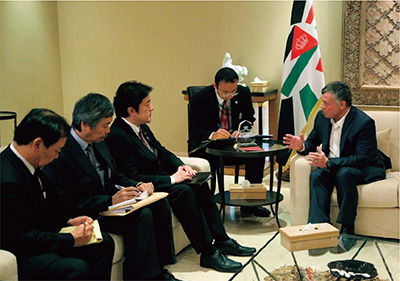 State Minister for Foreign Affairs Nakayama asking His Majesty King Abdullah II of Jordan for cooperation
State Minister for Foreign Affairs Nakayama asking His Majesty King Abdullah II of Jordan for cooperation(January 21, Amman, Jordan; Photo: the Jordan Government)
Incidents involving Japanese nationals were a traffic accident in Sanliurfa (Turkey) in January, a shark attack on a Japanese surfer at Shelly Beach (Australia) in February, the German-wings crash in the southern France in March, and a bus collision in Seattle, Washington (U.S.), in September.
As for large-scale natural disasters, a 7.8 magnitude earthquake occurred with its epicenter 80 km to the northwest of Kathmandu, the capital of Nepal in April. The earthquake and aftershocks killed over 8,000 people and injured more than 20,000. One Japanese national was killed and one injured.
As a case of a serious deterioration of security caused by political instability, in Yemen, armed forces of Saudi Arabia launched a military campaign against Houthi rebels in March and local security situation changed dramatically. While there was no serious damage suffered by Japanese nationals, MOFA confirmed the safety of Japanese nationals staying in Yemen and helped their evacuation.
In Europe, the rapid increase of refugees who came to Europe from instable regions in the Middle East and North Africa by sea and land caused social unrest such as confusion in transportation systems and clashes among the refugee groups. MOFA provided necessary information to Japanese nationals living there.
In addition, the tension between Israelis and Palestinians mounted in the West Bank and East Jerusalem, including the Old City of Jerusalem, since the end of September. Many people including tourists were injured in heated demonstrations and confrontations.
Regarding middle-ages and seniors, there have been reports of incidents in the high altitude mountains and the sea and also of getting illness while traveling; in particular, there were a number of cases of deaths caused by sudden illness when staying at hotels. In dealing with such incidents or illnesses, some family members of the victims faced troubles due to expensive medical fee or transportation costs compared to those in Japan, or insufficient medical services.
As for infectious diseases, the Ebola outbreak in West Africa, mainly in Guinea, Liberia and Sierra Leone, had a global impact since 2014 and the World Health Organization (WHO) declared a “Public Health Emergency of International Concern (PHEIC)”. However in 2015, the end of the outbreak in all of these three countries was declared.
Cases of infection with the Middle East respiratory syndrome coronavirus (MERS-CoV) mainly in the Middle East and human infection with avian influenza A (H7N9) in China were reported respectively. In addition to Dengue fever and malaria, other mosquito-borne infectious diseases such as Zika virus also continued to spread throughout the world. Moreover, people’s concern is growing on the influence of air pollution over their health in China, India and Southeast Asia.
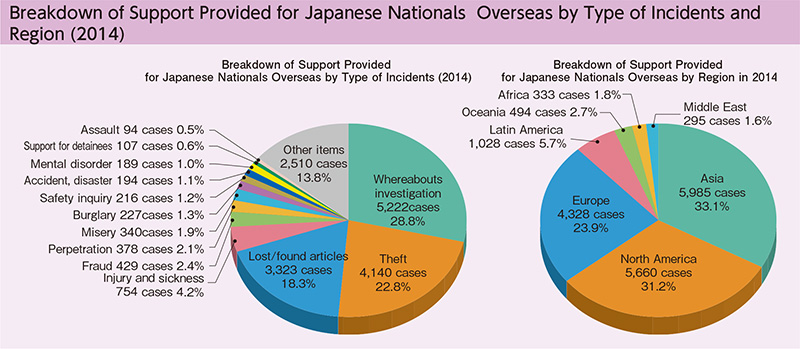
MOFA issues “travel advice and warning,” “spot safety information” or “region-wide safety information” on infectious disease to provide Japanese nationals traveling and living overseas with information on the current outbreak situation and prevention measures as well as with relevant warnings.
(Tips for Traveling and Living Abroad)
As described in the earlier sections, emergency situations posing threats to the safety of Japanese nationals are continuously occurring all around the world. When traveling and living abroad, in addition to “Overseas Travel Registration(“Tabi-Regi”)” or submission of Overseas Residential Registration, the following actions are important: (1) to check overseas safety information before their traveling on the Overseas Safety Website or through media reports, etc., (2) to take full safety measures and risk aversion actions to prepare for emergency situations while abroad, and (3) in an emergency, to contact the Japanese diplomatic missions overseas nearby, such as the embassy/consulate-general, and family members in Japan. Expensive medical fees may be incurred abroad due to diseases and accidents, and it may be difficult to pay the medical cost or to receive proper medical care without travel insurance. It is extremely important for each individual traveler to purchase travel insurance with sufficient coverage.
(2) Safety Measures for Japanese Nationals Abroad
As Japanese nationals expand their roles in the international community, the number of Japanese nationals supported or protected by the diplomatic missions overseas and the Interchange Association were continually kept at a high level. It increased in 2014 to 20,724 and the number of cases to 18,1231.
Therefore MOFA is enhancing and improving the contents of the Overseas Safety Website for the provision of safety information and as well as revising the functions and design of the website to enhance its usability.
The Consular Service Center of MOFA provides advice on safety issues abroad. In order to provide detailed response to the activities of Japanese nationals abroad, the center distributes a booklet titled “Kaigai Anzen Toranomaki” (“Essential Safety Tips for Overseas Travel”) which contains comprehensive safety measures, as well as pamphlets describing measures to be taken in each possible case, such as terrorism, kidnapping and intimidation. These pamphlets can also be downloaded from the Overseas Safety Website.
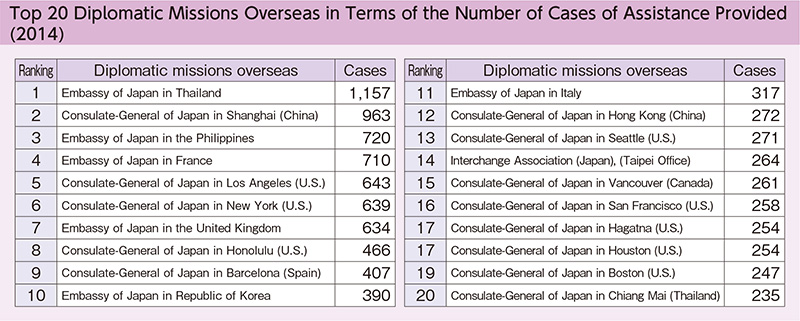
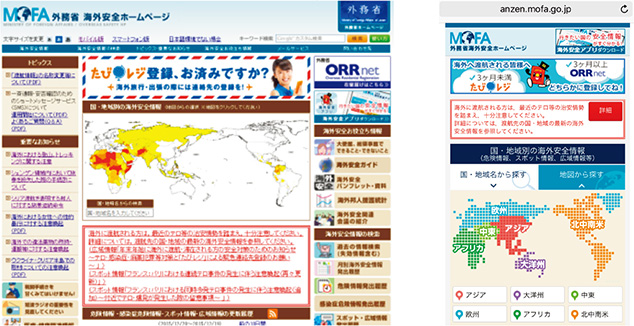 Overseas safety website (http://www.anzen.mofa.go.jp/)
Overseas safety website (http://www.anzen.mofa.go.jp/)- 1 The Statistics on Assistance for Japanese Involved in Accidents and Other Incidents is an annual report on the number of Japanese nationals involved in any kind of troubles overseas, such as incidents/accidents, acts of committing crimes, and falling victim to crime or disaster, and have received assistance provided by the diplomatic missions overseas and/or the Japan Foundation and was published in 1986 for the first time.
The threat of terrorism has increased all over the world, including sightseeing spots which were thought to be relatively safe, such as Paris where a series of terror attacks occurred in November 2015. The risk of short-stay travelers becoming involved in emergency situations increased remarkably.
Under these circumstances, to improve the level of recognition of the MOFA “Overseas Travel Registration (“Tabi-Regi”),” which was launched on July 1, 2014, MOFA works on advertisement through various media and promotes registration through collaborations with travel agency. In the event of an emergency, “Overseas Travel Registration (“Tabi-Regi”)” enables the diplomatic missions overseas to provide registered individuals with safety information in Japanese, and also to confirm their safety at critical moments. In March, emergency simultaneous notification to Japanese nationals abroad via short message services (SMS) on mobile phones2 started in ten countries and one region where many Japanese nationals live (ROK, Thailand, Malaysia, Singapore, Viet Nam, the Philippines, Indonesia, Australia, China including Hong Kong, Taiwan, and U.S.).
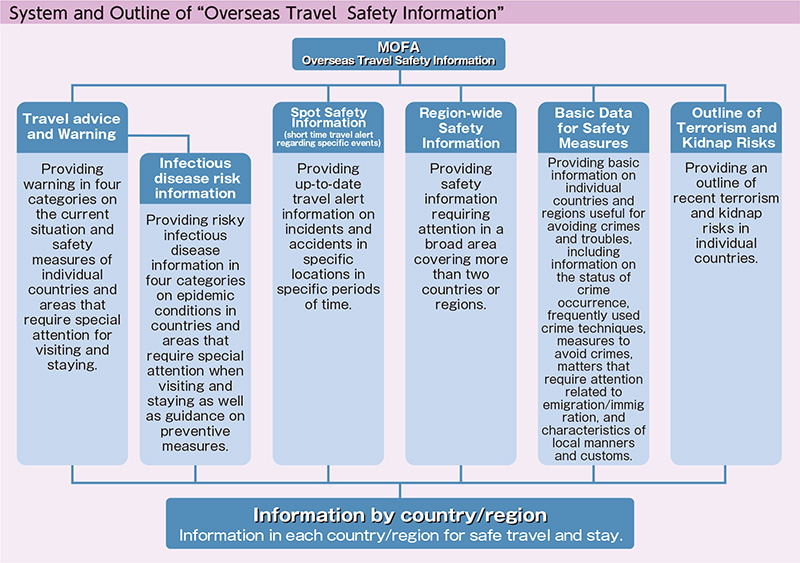
 MOFA “Overseas Travel Registration (“Tabi-Regi”)” (https://www.ezairyu.mofa.go.jp/tabireg/)
MOFA “Overseas Travel Registration (“Tabi-Regi”)” (https://www.ezairyu.mofa.go.jp/tabireg/) Download is available from MOFA Safety Application in Overseas Safety website “Kaigai Anzen Apuri no Haishin ni Tsuite (Overseas Safety Application Distribution)”
Download is available from MOFA Safety Application in Overseas Safety website “Kaigai Anzen Apuri no Haishin ni Tsuite (Overseas Safety Application Distribution)”(http://www.anzen.mofa.go.jp/c_info/oshirase_kaian_app.html)
- 2 Service sending a short text message between mobile phone or PHS users.
Moreover, MOFA promotes the strengthening of public-private partnerships to enhance the overseas safety of Japanese nationals. In Japan, MOFA held a “Seminar on Safety in Japan” in Tokyo (July), Nagoya (August), and Osaka (September) for companies operating overseas to improve their safety measures and risk management. Hands-on training for responding to terrorism and kidnapping in October and November was participated in by both public and private sectors in order to further effectuate the private-public collaboration in responding to emergency situations. Moreover, the meetings of the “Liaison Committee of Government and non-Government for Overseas Security” were held periodically to exchange information and views and to consult and discuss the common issues between Japanese private companies/organizations engaged in overseas activities and MOFA.
The diplomatic missions overseas have regular meetings of “Security Consultation and Liaison Committee” with local Japanese organizations and private representatives to enhance opinion exchange and information sharing regarding safety measures. MOFA is engaged in efforts to strengthen the safety measures for Japanese nationals abroad. For example, “Seminars on Overseas Safety Measures” were held to enhance knowledge and ability concerning safety measures and risk management for Japanese nationals abroad at 27 places in Europe, the Middle East, Africa, and Asia.
